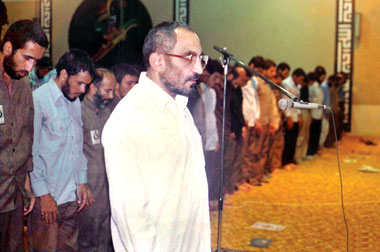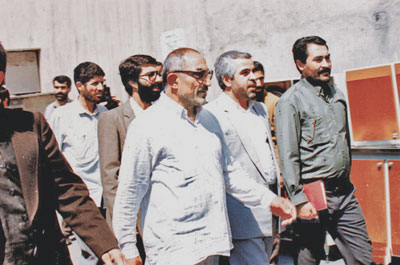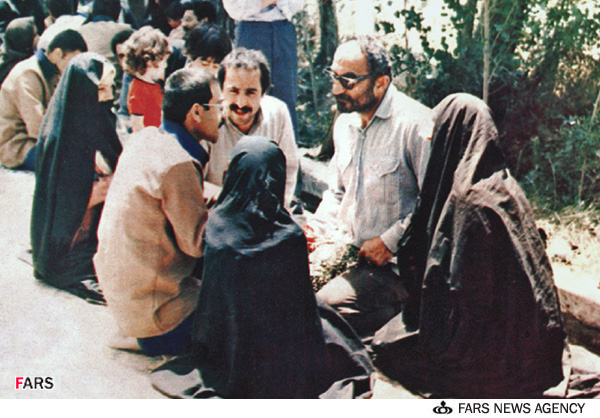| Martyr Lajevardi always treated the prisoners as guests and believed that the Islamic Republic had converted prisons into `rehabilitation centers` and `ideological schools`, where inmates studied Islam, learned the errors of their ways, and did penance before returning to society... |

Date of birth: 1935
Age: 63
Son of: Seyyed Ali Akbar
Occupation: Islamic Revolution prosecutor
Marital status: Married
Date of martyrdom: August 23, 1998
Place of martyrdom: Tehran bazaar
Seyyed Asadollah Lajevardi was born in a very religious family who lived in southern Tehran in 1934. His father Seyyed Ali Akbar acquainted his son with Islam and Quran from the very early years.
As a teenager he attended anti Zionist demonstrations led by Ayatollah Kashani and then expanded his political activities against the oppressing Shah of Iran. At the same time he continued his religious studies and also interpreted Quran.
As martyr Lajevardi played an important role in demonstrations and political activities against Pahlavi dictatorship, he was repeatedly arrested and prosecuted by SAVAK and was many times sent to prison where he experienced very harsh tortures.
He was the first to talk about Mojahedin-e Khalq corruption while in prison. During the era called as “prison in prison” because in prison he was boycotted by the elements of MKO.
After the victory of the Islamic Revolution martyr Lajevardi was appointed the Islamic Revolution Prosecutor General. After that he became the director of the organization for prisons. Seyyed Asadollah Lajevardi was finally targeted and killed by MKO terrorist elements on August 23, 1998 while he was working in his shop in Ja’afari Bazaar in Tehran.
 Martyr Lajevardi; a Revolution’s watch
Martyr Lajevardi; a Revolution’s watch
Martyr Sayyed Asadollah Lajevardi was born in a religious family of believers in Southern Tehran in 1935.
He studied theological sciences before working as a bazaar draper. Martyr Lajevardi was a religious opponent of the Shah of Iran and was arrested several times by SAVAK for his anti-dictatorship revolutionary activities. Once he was sent to Evin prison for attempting to blow up the offices of El Al (the Israeli airline) in Iran.
In 1979, with the victory of the Islamic Revolution in Iran, he was appointed the chief prosecutor of Tehran, where he played a decisive role in illuminating and repentance of many of those misled prisoners who were deceived by the anti- Revolutionary terrorist groups especially the Mujahedin-e Khalq (MKO, MEK, PMOI, NCRI...) and Forghan. Lajevardi was given the added post of warden in June 1981 after the first post-revolutionary warden of Evin, Mohammad Kachouyi, was assassinated by MKO terrorist elements. Sayyed Asadollah Lajevardi who would like better to be addressed as Haji Agha, devoted his life living in prison for the enlightenment of prisoners and to know more about their problems and their families’ difficulties. To do this he even brought his family to live there.
Martyr Lajevardi always treated the prisoners as guests and believed that the Islamic Republic had converted prisons into `rehabilitation centers` and `ideological schools`, where inmates studied Islam, learned the errors of their ways, and did penance before returning to society. As the chief warden of Evin - the main political prison in Tehran - Ladjevardi believed that more than 95% of his `guests` eventually regret their past political errors and praise of the Islamic Republic and the prison staff.
Finally Martyr Lajevardi who was like a thorn in the eyes of the enemies of the Islam and the Revolution and always neutralized their conspiracies, was assassinated by MKO terrorist elements by an Uzi submachine gun while he was, after retirement, in his tailor-shop in Tehran Bazaar.
Following the martyrdom of this brave Clear-sighted guardian of the Revolution, the MKO terrorist elements in Iran issued a statement through which they assumed responsibility for the terrorist operation.

